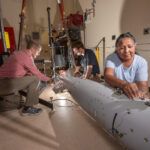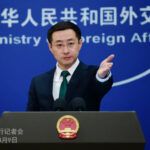North Korea’s latest missile test
By Dan Drollette Jr | July 5, 2017
Over the July 4 weekend, North Korea ironically announced a little “gift” to the United States in the form of the successful test of an intercontinental missile that could reach Alaska—albeit one that was NOT armed with a nuclear weapon. (Miniaturizing a nuclear bomb enough so that it could fit in the confines of a rocket seems to be beyond the efforts of the regime. At least, for now.)
Technically speaking, says the BBC News, “The launch of the North’s Hwasong-14 rocket is in practical terms merely an incremental step forward from an earlier launch in May, when a similar rocket flew for 30 minutes, to a height of some 1,312 miles (2,111 kilometers) over a distance of some 489 miles. The most recent missile added seven to nine minutes of flight time, an extra 400 miles or so in height and a further 88 miles in overall distance…Yet, by bringing Alaska within range, the new test is an unambiguous game-changer in both symbolical and practical terms.”
The fact that Kim Jong-un’s regime could get this far has really stirred up things on the Korean peninsula, especially in light of the fact that as recently as April, US officials were bullish about a secretive program to sabotage North Korea’s missile program, as seen in a New York Times story titled “Trump inherits a secret cyberwar against North Korean missiles.” It had sounded similar to the successful US program with the Stuxnet virus, which had ruined Iran’s centrifuges and therefore slowed Iran’s nuclear weapons effort.
As to other plans to deal with North Korea, it seems that President Trump’s only apparent strategy has been to lean on China to influence North Korea, reports the Washington Post in a story titled “Trump has never had a plan for dealing with North Korea.”
This strategy was in spite of the fact that at the end of the day, there really isn’t all that much that China can do to influence its bellicose neighbor—as the Bulletin pointed out in our April story “North Korea in the news again: A time to reflect,” published immediately after North Korea conducted an earlier, (failed) test. Reinforcing this point, historian Bruce Cumings noted in our pages in “The North Korea that can say ‘no’ ” that China’s ability to pull strings in the so-called hermit kingdom is limited: “North Korea’s obstreperous behavior, so exasperating to foreign powers, might also be seen as a Game Theory 101 strategy by a small country surrounded by bigger powers who, when all is said and done, really don’t like their smaller neighbor. Roar loudly, beat your chest, threaten all manner of mayhem, and recall Muhammad Ali’s maxim: ‘I don’t have to be who you want me to be.’ ” (Cumings, who wrote a history of the Korean War, and was the principal consultant on a six-hour-long Korean War PBS documentary, also did a more in-depth piece for our Journal, titled “Getting North Korea wrong” which is currently behind a paywall.)
There is a more promising approach, wrote Andrei Lankov in one of the Bulletin’s Roundtables on North Korea’s nuclear weapons, titled “The Korean compromise to come.” Lankov argues that the best—or least bad—approach may be to try for a new, updated version of a Clinton-era program, which had succeeded in slowing the North’s nuclear program. Under the 1994 Agreed Framework, North Korea agreed to freeze operations and then dismantle its graphite-moderated reactors. In exchange, it was to receive regular shipments of crude oil and two light water reactors for electricity generation.
Publication Name: BBC News
To read what we're reading, click here
Together, we make the world safer.
The Bulletin elevates expert voices above the noise. But as an independent nonprofit organization, our operations depend on the support of readers like you. Help us continue to deliver quality journalism that holds leaders accountable. Your support of our work at any level is important. In return, we promise our coverage will be understandable, influential, vigilant, solution-oriented, and fair-minded. Together we can make a difference.
Topics: Nuclear Weapons, Special Topics, What We’re Reading















